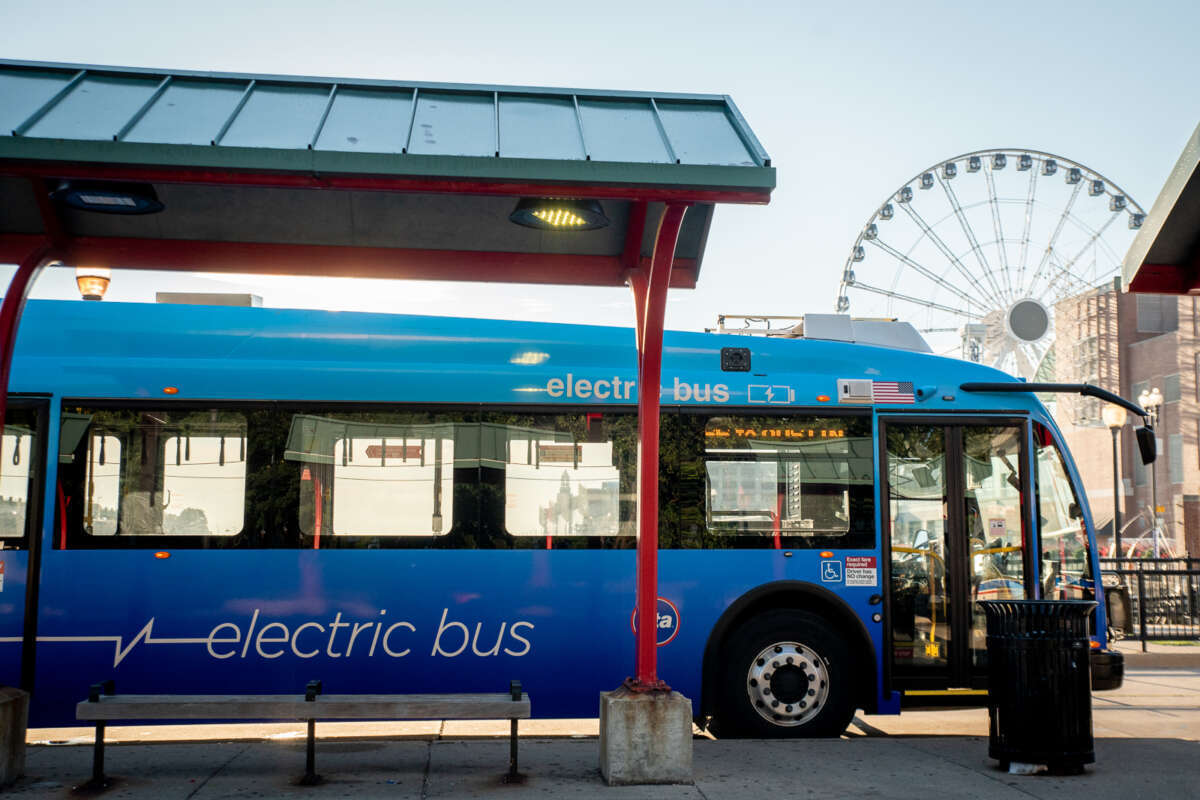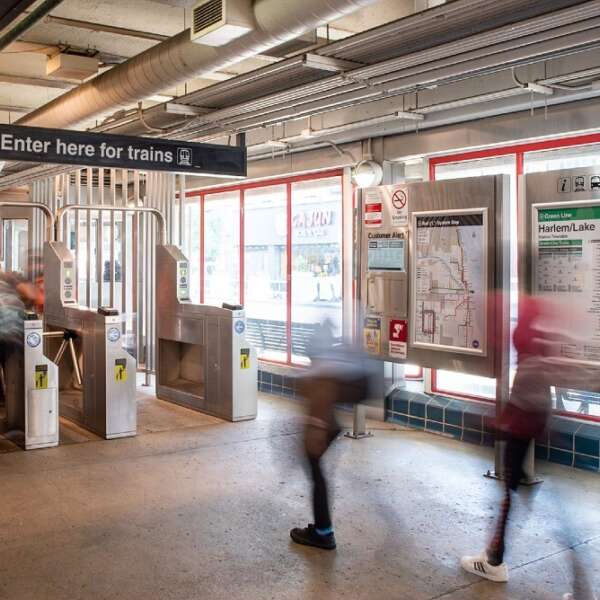Transit is the answer to meeting Illinois’ climate goals
April 18, 2024
April 18, 2024

As we celebrate Earth Day 2024, the RTA is announcing Transforming Transit —the agency’s commitment to lead the Chicago region’s transit system into the future recognizing that transit is the greatest tool in the fight against climate change both by achieving a zero-emission system, and by encouraging more people to shift from cars to transit.
Transit accounts for just 2 percent of the region’s transportation emissions, while cars and trucks account for 59 percent. To further reduce the carbon footprint of transit, CTA, Metra, and Pace have made important progress in transitioning to zero-emission fleets, including collaborating with RTA on a regional application for $375 million in federal grant funding to purchase and deploy state-of-the-art green technology through a proposal submitted to the U.S. EPA earlier this month.
The agencies are also committed to growing ridership, which helps to reduce emissions by taking more drivers off the road and onto transit, which is inherently a more sustainable mode of travel.
Using new metrics to assess capital programming, RTA is prioritizing projects that mitigate climate impact, improve racial equity, and enhance service reliability. By prioritizing sustainable transportation projects in the communities most affected by climate change and improving service and reliability, transit is the answer to meeting the state’s climate goals.
While the RTA is committed to Transforming Transit, we cannot do it alone. The RTA’s 2024 State Legislative Agenda calls on lawmakers to reform how we plan, evaluate, and prioritize transportation projects to fully leverage the transit system to meet state climate goals.
One such reform, which lawmakers have considered in various forms over the years, is setting regional greenhouse gas emissions targets for the transportation sector. The federal government has already provided state Departments of Transportation (DOT) and Metropolitan Planning Organizations (MPO) with a national framework to track and reduce transportation-related emissions. The administrative rule allows states the flexibility to set their own targets for reduction, and the Infrastructure Investment and Jobs Act (IIJA) provides additional funding to states that implement on-road carbon reduction policies. The Inflation Reduction Act doubled down on these commitments, using the largest investment in reducing carbon pollution in U.S. history to catalyze economic growth.
The Climate Pollution Reduction Grants (CPRG) program, for example, provides $5 billion to states and local governments to develop and implement ambitious plans for reducing greenhouse gas emissions and other harmful air pollution. With transportation representing nearly 30 percent of greenhouse gas emissions nationally, this is a critical opportunity for states to leverage federal investment to reduce the transportation network’s environmental footprint.
Under this program, the RTA is seeking $375 million in federal grant funding to fight climate change in the Chicago region. “Transforming Transit: Accelerating a Zero-Emission Fleet in the Chicago region” would allow CTA, Metra, and Pace to purchase and deploy state-of-the-art green technology benefiting riders and residents, with a focus on communities overburdened by poor air quality and related health effects.
If awarded, the CPRG funding would be a transformative investment in the fight against climate change in our region, funding the following investments:
Together the improvements included in this phase of Transforming Transit will reduce carbon dioxide emissions in the transportation sector by a total of 40,568 tons annually once fully implemented. In the near term, the project will result in a 135,506-ton GHG reduction from 2025 to 2030, and a cumulative 402,165-ton GHG reduction from 2025 to 2050. Read more in a press release and project summary.
Illinois has already taken first steps to reducing emissions from the transportation sector under the Climate and Equitable Jobs Act (CEJA). The policies behind those ambitious goals, however, prioritize the electrification of personal vehicles and don’t provide enough resources for transit. Our transportation policies must provide greater support for transit to make the most of our emission reduction efforts, and the environmental cost of driving should be accurately reflected in how the state distributes transportation funding.
Despite market obstacles to procuring zero-emission buses, CTA, Metra, and Pace have made significant progress in electrifying their fleets. As outlined in CTA’s Charging Forward and Pace’s Project Zero fleet transition plans, both service boards are committed to fully electrifying their fleets by 2040. The CTA currently has 25 electric buses in its fleet with 22 additional buses purchased, and three of its seven existing bus garages are now equipped with some charging facilities for electric buses. Pace secured its first electric bus in November 2022, which has since entered service, and 20 more are expected for delivery this year. Metra will be one of the first transit agencies in the nation to operate battery electric trainsets, recently approving a contract for eight trainsets with expected delivery by 2028.
The costs of zero-emission buses can present significant hurdles to greening transit fleets. At approximately $1.2 million per battery-electric bus and with 2,500 buses in the fleet, the total estimated cost to replace all diesel buses between the CTA and Pace is over $3 billion. RTA and the state should explore innovative purchase agreements for statewide or regional electric bus purchases to overcome issues with manufacturing hindering demand for buses. IDOT already uses this strategy with their Consolidated Vehicle Procurement Program, which secured $57.1 million in new fleet vehicles for downstate transit agencies and paratransit service providers this year. Even more ambitiously, the Canadian and Quebec governments purchased nearly 1,300 electric buses for $2.1 billion last year in the largest bus acquisition project in North America.
The Service Boards are dedicating a significant amount of their own resources to electrification and have entered into similar purchase agreements. In March 2022, Pace joined the State of Georgia’s contract with Proterra—an electric bus manufacturer—to procure buses for its North Division routes, which are on their way to full electrification. With additional funding and creative purchase agreements like these, we can build on the momentum to make meaningful progress on the state’s emission reduction targets.
If awarded, the CPRG Transforming Transit funding would help make significant progress toward CTA and Pace’s electric bus commitments with the opportunity to purchase more than 100 electric buses with the potential federal funding.
The Illinois Department of Transportation (IDOT) proposes a more than $2 billion increase for its next Multi-Year Plan for FY2024-2029, much of which comes directly from drivers in the form of user fees—like motor fuel taxes and vehicle registration fees. As the state deliberates how to fund transit’s capital needs, these sources of funding—with some modernization—offer sustainable solutions to achieving a state of good repair. As part of the Rebuild Illinois program, lawmakers took a first step to modernizing transportation funding by increasing and indexing the Motor Fuel Tax to inflation, creating a sustainable source of revenue for transportation. Redirecting a portion of user fee revenue, like the Motor Fuel Tax, could provide the region with the funding needed to keep transit infrastructure in a state of good repair, which is estimated at $40 billion over the next 10 years.
As legislative activity continues in Springfield, the RTA will advocate to lawmakers on the importance transit has in addressing climate change. By building a greener transit network, transitioning drivers into riders, and creating sustainable sources of funding to keep the system in a state of good repair, Illinois has a once-in-a-generation opportunity to lead the nation in the fight against climate change. Join the Transit is the Answer Coalition to help bring about the legislative changes needed to transform transportation planning and preserve our planet.
This blog is one in a series exploring RTA’s 2024 State Legislative Agenda, which presents lawmakers with a slate of potential options to fully fund, reform, and improve our region’s transit network.
Subscribe to our Newsletter
Related Articles
 Why fully funding paratransit service and reduced fare programs is key to closing the transit budget gap
Why fully funding paratransit service and reduced fare programs is key to closing the transit budget gap
With transit facing a fiscal cliff in 2026, fully funding critical programs like ADA paratransit service and free and reduced fare programs is one key to clo...
February 18, 2025 New stations on CTA Green Line, Metra UP-N line increase transit access for residents, riders
New stations on CTA Green Line, Metra UP-N line increase transit access for residents, riders
In 2024, CTA and Metra opened two new stations: the Damen station in Chicago’s Near West Side neighborhood along CTA’s Green Line and the Peterson/Ridge stat...
January 28, 2025 2025 Regional transit budget available for public comment, foreshadows risk to system’s future without fiscal cliff solution
2025 Regional transit budget available for public comment, foreshadows risk to system’s future without fiscal cliff solution
The RTA has released the 2025 Regional Transit Operating Budget and Five-Year Capital Program for download and public comment. The budget comes as an operati...
November 15, 2024 With equity at the forefront, CTA, Metra, and Pace open new facilities, prioritize upgrades in south and west communities
With equity at the forefront, CTA, Metra, and Pace open new facilities, prioritize upgrades in south and west communities
This year, CTA and Pace have opened or advanced various new facilities in south and west communities throughout the region, and Metra has prioritized upgrade...
October 9, 2024 New project management oversight report highlights more than 100 projects representing $8.2 billion in capital investments
New project management oversight report highlights more than 100 projects representing $8.2 billion in capital investments
The RTA’s Project Management Oversight (PMO) program ensures that the Service Boards—CTA, Metra, and Pace—are spending capital funds and managing their infra...
June 27, 2024 Transportation Tuesday recap: Improving and expanding the transit system strategically
Transportation Tuesday recap: Improving and expanding the transit system strategically
With last year’s adoption of Transit is the Answer came 15 new evaluation metrics that comprise a strategy for evaluating and selecting capital projects. Now...
May 30, 2024